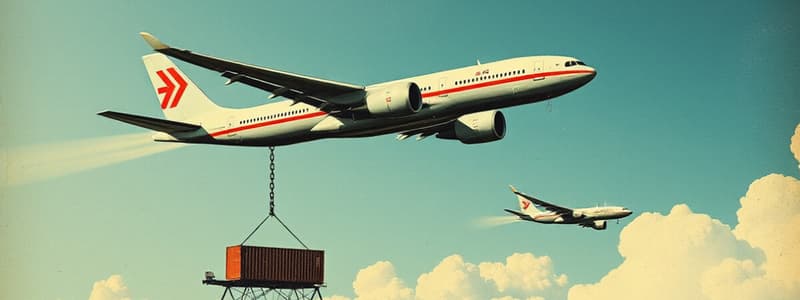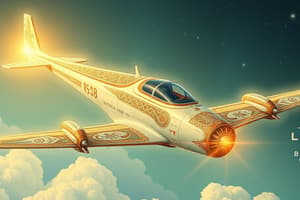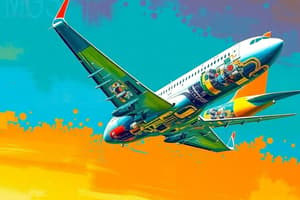Podcast
Questions and Answers
What is a primary benefit of Auto Flight in commercial aviation?
What is a primary benefit of Auto Flight in commercial aviation?
- Increased reliance on manual controls
- Reduced operational costs without technology
- Improved efficiency and safety (correct)
- Limitation on flight paths
Which system is essential for the operation of Auto Flight technologies?
Which system is essential for the operation of Auto Flight technologies?
- Basic navigation tools
- Communication systems (correct)
- Traditional aviation protocols
- Manual flight controls
What is a significant challenge currently facing the implementation of Auto Flight?
What is a significant challenge currently facing the implementation of Auto Flight?
- Public acceptance and regulatory framework (correct)
- Consistent weather conditions for flying
- Technical simplicity of autopilot systems
- High operational costs of aircraft
What does the attitude hold function achieve in Auto Flight?
What does the attitude hold function achieve in Auto Flight?
Which mode in Auto Flight specifically deals with lateral control?
Which mode in Auto Flight specifically deals with lateral control?
What does the airspeed hold function control in an autopilot system?
What does the airspeed hold function control in an autopilot system?
Why is redundancy important in systems like the A320's pitot tubes?
Why is redundancy important in systems like the A320's pitot tubes?
Which component is used to measure both airspeed and altitude during a flight?
Which component is used to measure both airspeed and altitude during a flight?
What is the primary purpose of static pressure ports in aircraft?
What is the primary purpose of static pressure ports in aircraft?
Which mode of GPS is utilized during the main portion of the flight?
Which mode of GPS is utilized during the main portion of the flight?
How does the Wide Area Augmentation System (WAAS) enhance GPS functionalities?
How does the Wide Area Augmentation System (WAAS) enhance GPS functionalities?
What is the main function of gyroscopes in aircraft?
What is the main function of gyroscopes in aircraft?
What technology do Inertial Navigation Systems (INS) combine for navigation?
What technology do Inertial Navigation Systems (INS) combine for navigation?
What type of altimeter measures distance by transmitting electromagnetic waves?
What type of altimeter measures distance by transmitting electromagnetic waves?
What is the primary function of actuators in autopilot systems?
What is the primary function of actuators in autopilot systems?
During which phase is GPS in terminal mode utilized?
During which phase is GPS in terminal mode utilized?
Flashcards are hidden until you start studying
Study Notes
Auto Flight Overview
- Auto Flight enables autonomous aircraft operation, eliminating the need for human pilots.
- Utilizes advanced technologies to enhance aviation safety and efficiency.
Auto Flight Applications
- Commercial Aviation: Boosts safety and improves operational efficiency for airlines.
- Cargo Transport: Facilitates goods delivery to remote or hard-to-reach areas.
Key Technologies Driving Auto Flight
- Sensors: Essential for collecting data about aircraft performance and environment.
- Artificial Intelligence: Enhances decision-making capabilities in autonomous flight operations.
- Communication Systems: Ensures reliable data transmission between aircraft and ground control.
Challenges to Auto Flight Implementation
- Regulatory Framework: Need for updated regulations to govern autonomous flights.
- Public Acceptance: Gaining trust from the public and stakeholders regarding safety and efficiency.
- Cybersecurity: Protecting aircraft systems from potential cyber threats.
Future of Auto Flight
- Expected growth of autonomous aircraft in various applications.
- Potential to significantly revolutionize the aviation sector.
Autopilot Modes
- Attitude Hold: Maintains a pre-selected altitude automatically by adjusting control surfaces.
- Heading Hold: Adjusts the aircraft's direction by controlling rudder and aileron surfaces.
- Airspeed Hold: Maintains desired speed by adjusting throttle or engine power.
Mode Classifications
- Lateral Modes: Control aircraft movement side to side.
- Vertical Modes: Manage altitude and vertical movements including altitude hold and vertical speed hold.
- Combined Modes: Allow simultaneous engagement of both lateral and vertical modes for flexible flight management.
Sensor Technology in Autopilot
- Pitot Tubes: Measure airspeed and altitude; key for flight safety and performance.
- Static Pressure Ports: Supply static air pressure for altitude calculations.
- Gyroscopes: Detect changes in aircraft attitude (roll, pitch, yaw) for stability.
Global Positioning System (GPS)
- Provides high navigational precision through three operational modes:
- En Route: Navigation between waypoints during flight.
- Terminal: Transitioning near the destination airport.
- Approach: Guidance during final approach and landing.
GPS Components
- Space Segment: Consists of satellites that provide location data.
- Control Segment: Ground-based systems for monitoring satellite status.
- User Segment: Aircraft systems that utilize GPS data.
Enhancement Systems
- Wide Area Augmentation System (WAAS): Improves GPS signal accuracy for various flight phases.
- Inertial Navigation Systems (INS): Combines gyroscope and accelerometer data for navigation.
- Radar Altimeters: Measure altitude using emitted electromagnetic waves.
Additional Avionics Tools
- Weather Radar: Essential for on-board weather monitoring, present in all aircraft sizes.
- Air Data Computers (ADC): Crucial avionics for processing air data and maintaining aircraft performance.
Actuators in Autopilot
- Function: Convert signals into motion, allowing for automatic adjustments in aircraft systems.
- Hydraulic Actuators: Utilize fluid power to generate high force and torque efficiently.
Studying That Suits You
Use AI to generate personalized quizzes and flashcards to suit your learning preferences.




